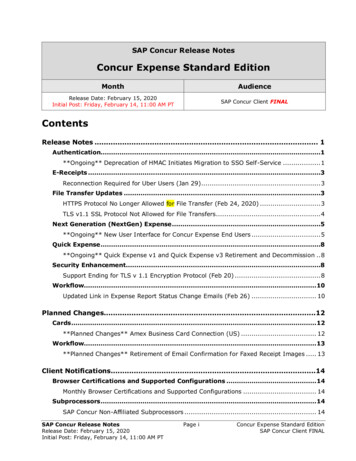
Transcription
F E B R UARY 2 02 034567LARGE PRINT EDITIONSTUDY ARTICLES FOR:APRI L 6 –MAY 3 , 2020
STUDYARTICLE6Jehovah, Our Father,Loves Us Dearly“You must pray, then, this way: ‘Our Father.’ ”—MATT.6:9.SONG 135Jehovah’s Warm Appeal: “Be Wise, My Son”PREVIEWWe often think of Jehovah as our Creator and SovereignRuler. But we have good reasons for viewing him asa loving and caring Father. This article will considerthose reasons. We will also learn why we can be surethat Jehovah will never abandon us.2
IMAGINE that you are living some 2,500 years agoin Persia. You want to speak to the king of the landabout a matter, so you travel to the royal city ofShushan. You would not even think of approachingthe monarch without first receiving his permission.To do otherwise could very well cost you your life!—Esther 4:11.2How thankful we are that Jehovah is not like thatPersian king! Jehovah is vastly superior to any human ruler, and yet he welcomes us at any time. Hewants us to feel free to approach him. For example,although Jehovah bears such lofty titles as GrandCreator, Almighty, and Sovereign Lord, we are invited to call on him using the familiar term “Father.”(Matt. 6:9) How touching that Jehovah wants us toview him in such a warm and intimate way!3We can rightly call Jehovah “Father”—he is theSource of our life. (Ps. 36:9) Because he is our Father, we have a responsibility to obey him. When wedo what he asks of us, we will enjoy marvelous blessings. (Heb. 12:9) Those blessings include everlastinglife, whether in heaven or on earth. We also enjoy1. What was involved in approaching a king of Persia?2. How can we feel about approaching Jehovah?3. Why can we call Jehovah “Father,” and what will this article discuss?FEBRUARY 20203
benefits now. This article will discuss how Jehovahacts as a loving Father now and why we can be surethat he will never abandon us in the future. But first,let us consider why we can be confident that ourheavenly Father loves us dearly and cares for us.JEHOVAH IS A LOVING AND CARING FATHER4Do you find it difficult to think of God as yourFather? Some may feel small and insignificant incomparison to Jehovah. They doubt that AlmightyGod cares about them as individuals. Yet, our lovingFather does not want us to feel that way. He gave uslife and wants us to have a relationship with him. After stating this truth, the apostle Paul explained tohis listeners in Athens that Jehovah “is not far offfrom each one of us.” (Acts 17:24-29) God wantseach one of us to go to him just as a child naturally goes to a loving and caring parent.5Others may find it hard to view Jehovah as theirFather because their own human father showedthem little or no love and affection. Consider thecomments of one Christian sister. “My father wasvery abusive,” she says. “When I first began to studythe Bible, it was difficult for me to relate to a heav4. Why do some find it difficult to view Jehovah as their Father?5. What do we learn from the experience of one Christian sister?4THE WATCHTOWER
enly Father. But after I came to know Jehovah, thatall changed.” Do you have similar feelings? If so, beassured that you too can come to see Jehovah as thebest possible Father.6One way that Jehovah has helped us to view himas our loving Father is by having Jesus’ words andactions recorded in the Bible. (Read Matthew 11:27.) Jesus so perfectly reflected his Father’s personality that he could say: “Whoever has seen mehas seen the Father also.” (John 14:9) Jesus oftenspoke about the role that Jehovah fulfills as a Father. In the four Gospels alone, Jesus used the term“Father” some 165 times in reference to Jehovah.Why did Jesus speak so much about Jehovah? Onereason is that people might be convinced that Jehovah is a loving Father.—John 17:25, 26.7Consider what we learn about Jehovah from theway that he treated his Son, Jesus. Jehovah alwaysheard Jesus’ prayers. He not only heard Jesus’prayers but also answered them. (John 11:41, 42)No matter what trials Jesus faced, he sensed his Father’s love and support.—Luke 22:42, 43.6. According to Matthew 11:27, what is one way that Jehovah hashelped us to view him as our loving Father?7. What do we learn about Jehovah from the way that he treatedhis Son?FEBRUARY 20205
8Jesus acknowledged that his Father was theSource and Sustainer of his life when he stated: “Ilive because of the Father.” (John 6:57) Jesus completely trusted in his Father, and Jehovah suppliedhis physical needs. Most important, Jehovah caredfor Jesus spiritually.—Matt. 4:4.9As a loving Father, Jehovah made sure that Jesus knew he had his Father’s backing. (Matt. 26:53;John 8:16) While Jehovah did not shield Jesus fromall injury, He helped him to endure trials. Jesuswas assured that any harm he might suffer wouldbe temporary. (Heb. 12:2) Jehovah proved that hecared for Jesus by listening to him, providing forhim, training him, and supporting him. (John 5:20;8:28) Let us now see how our heavenly Father caresfor us in similar ways.HOW OUR LOVING FATHER CARES FOR US10Jehovah listens to our prayers. (Read Psalm 66:19, 20.) He does not want us to limit our prayers; heurges us to pray often. (1 Thess. 5:17) We can re8. In what ways did Jehovah provide for Jesus?9. How did Jehovah prove to be a loving and caring Father to Jesus?10. According to Psalm 66:19, 20, how does Jehovah show that heloves us?6THE WATCHTOWER
spectfully approach our God at any time, no matterwhere we are. He is never too busy to listen to us;he is always available and attentive. When we appreciate that Jehovah listens to our prayers, we aredrawn to him. “I love Jehovah,” said the psalmist,“because he hears my voice.”—Ps. 116:1.11Our Father not only listens to our prayers butalso answers them. The apostle John assures us:“No matter what we ask according to [God’s] will,he hears us.” (1 John 5:14, 15) Of course, Jehovahmay not answer our prayers in the way that we expect. He knows what is best for us, so sometimes hisanswer is no or he wants us to wait.—2 Cor. 12:7-9.12Jehovah provides for us. He does what he requires all fathers to do. (1 Tim. 5:8) He cares for thematerial needs of his children. He does not want usto be anxious about our food, clothing, or shelter.(Matt. 6:32, 33; 7:11) As a loving parent, Jehovahhas even arranged to satisfy all our future needs.13Most important, Jehovah provides for our spiritual needs. Through his Word, he has revealedthe truth about himself, his purpose, the meaning of life, and the future. He showed us personal11. How does Jehovah respond to our prayers?12-13. In what ways does our heavenly Father provide for us?FEBRUARY 20207
1234Jehovah wants to beclose to us, just as acaring father wants tobe close to his children(See paragraph 4)
A loving human father (1) listens to, (2) provides for,(3) trains, and (4) protects his children. Our loving heavenlyFather cares for us in similar ways(See paragraphs 10-15)attention when we first learned the truth, using ourparents or another teacher to help us come to knowhim. And we continue to receive kind assistancefrom loving congregation elders and other maturebrothers and sisters. In addition, Jehovah instructsus through our congregation meetings, where welearn alongside our spiritual family. In these andother ways, Jehovah shows his fatherly interest inall of us.—Ps. 32:8.14Jehovah trains us. Unlike Jesus, we are imperfect. So as part of our training, our loving Fatherdisciplines us when necessary. His Word reminds us:“Those whom Jehovah loves he disciplines.” (Heb.12:6, 7) Jehovah disciplines us in many ways. For instance, something we read in his Word or hear atour meetings may correct us. Or perhaps the helpwe need comes from the elders. Regardless of theform it takes, Jehovah’s discipline is always motivated by love.—Jer. 30:11.14. Why does Jehovah train us, and how does he do so?FEBRUARY 20209
15Jehovah supports us through trials. Just as acaring human father supports his children during difficult times, our heavenly Father sustains usthrough trials. He uses his holy spirit to protect usfrom spiritual harm. (Luke 11:13) Jehovah also protects us emotionally. For example, he gives us a marvelous hope. That hope for the future helps us to endure difficulties. Consider this: No matter what badthings happen to us, our loving Father will undo anyinjury we suffer. Whatever trials we are facing,these are only temporary, but the blessings Jehovahgives are everlasting.—2 Cor. 4:16-18.OUR FATHER WILL NEVER ABANDON US16We see proof of Jehovah’s love for us in the wayhe responded to the problems that first arose within his earthly family. When Adam disobeyed hisheavenly Father, he lost his place in Jehovah’s happy family, both for himself and for his descendants.(Rom. 5:12; 7:14) Jehovah, however, stepped in tohelp.17Jehovah punished Adam, but he did not leaveAdam’s unborn offspring without hope. He imme15. In what ways does Jehovah protect us?16. What happened when Adam disobeyed his loving Father?17. After Adam’s rebellion, what did Jehovah immediately do?10THE WATCHTOWER
diately promised that obedient humans would bebrought back into his family. (Gen. 3:15; Rom. 8:20,21) Jehovah arranged for this on the basis of theransom sacrifice of his beloved Son, Jesus. By giving his Son in our behalf, Jehovah proved how dearly he loves us.—John 3:16.18Though we are imperfect, Jehovah wants us inhis family, and he never considers us to be a burden.18. Why can we be sure that Jehovah wants us as his children, evenif we have strayed from him?If we have strayed from God but are repentant, our loving Father,Jehovah, is ready and willing to welcome us back(See paragraph 18)
We may disappoint him or stray awhile, but Jehovahdoes not give up on us. Jesus illustrated the depthof Jehovah’s fatherly care with the story of the sonwho was lost. (Luke 15:11-32) The father in that illustration never stopped hoping that his son wouldreturn. When the son made his way home, the fathereagerly welcomed him back. If we have strayed fromJehovah but are repentant, we can be sure that ourloving Father is ready and willing to welcome usback.19Our Father will repair all the damage caused byAdam. After Adam’s rebellion, Jehovah purposed toadopt 144,000 individuals from among mankindwho will serve as kings and priests in heaven withhis Son. Jesus and those associate rulers will helpobedient humans to come to perfection in the newworld. After they pass a final test of obedience, Godwill grant them everlasting life. Our Father will thenhave the satisfaction of seeing the earth filled withhis perfect sons and daughters. What a glorioustime that will be!20Jehovah has shown that he loves us dearly. Heis the ideal Father. He hears our prayers and pro19. How will Jehovah repair the damage caused by Adam?20. In what ways has Jehovah shown that he loves us dearly, andwhat will the next article discuss?12THE WATCHTOWER
vides what we need, both materially and spiritually.He trains and supports us. He also has wonderfulblessings in store for us. It warms our heart to knowthat our Father loves and cares for us! Our next article will discuss ways that we, as his children, canrespond to his love.PICTURE DESCRIPTIONS Page 8: Each of the four scenes depictsa father with his child: a father listening attentively to his son, a fatherproviding for his daughter’s needs, a father giving training to his son,and a father consoling his son. The drawing of the hand of Jehovahbehind the four scenes reminds us that Jehovah cares for us insimilar ways.HOW WOULD YOU ANSWER? Why do you feelthat Jehovah isthe best possibleFather? In what waysdoes Jehovahshow that heloves and caresfor us? Why can we becertain that ourFather will neverabandon us?SONG 108God’s Loyal Love
STUDYARTICLE7We Love Jehovah,Our Father, Dearly“We love, because he first loved us.”—1JOHN 4:19.SONG 3Our Strength, Our Hope, Our ConfidencePREVIEWWe know that our Father, Jehovah, loves us dearly and hasbrought us into his family of worshippers. In response,we are moved to love him. How can we express our love toour caring Father? This article will consider some specificthings we can do.14
JEHOVAH has invited us to join his family of worshippers. What a marvelous invitation that is! Ourfamily is made up of those who have dedicatedthemselves to God and who exercise faith in the ransom sacrifice of his Son. Ours is a happy family. Weenjoy a meaningful life now, and we rejoice in theprospect of life without end—whether in heaven orin Paradise on earth.2Moved by love and at great cost to himself, Jehovah opened the way for us to be part of his family. (John 3:16) We were “bought with a price.”(1 Cor. 6:20) By means of the ransom, Jehovahmade it possible for us to have a warm relationshipwith him. We have the honor of addressing thegreatest Person in the universe as Father. And, as weconsidered in the preceding article, Jehovah is theideal Father.3Like one Bible writer, we might ask: “With whatwill I repay Jehovah for all the good he has done forme?” (Ps. 116:12) The answer is that we can neverrepay our heavenly Father. Still, we feel moved tolove him. The apostle John wrote: “We love, because1-2. Why and how did Jehovah open the way for us to be part of hisfamily?3. What questions might we ask? (See also the box “Does JehovahNotice Me?”)FEBRUARY 202015
Does Jehovah Notice Me?Have you ever asked yourself, ‘Of all the billions of peoplealive on earth, why would Jehovah take notice of me?’ If so,you are in good company. King David wrote: “O Jehovah,what is man that you should notice him, the son of mortalman that you should pay attention to him?” (Ps. 144:3)David was confident that Jehovah knew him well. (1 Chron.17:16-18) And through his Word and his organization,Jehovah reassures you that he notices the love you showfor him. Consider some statements in God’s Word that canhelp you be certain of that fact: Jehovah noticed you even before you were born.—Ps. 139:16. Jehovah knows what is in your heart, and he knows whatyou are thinking.—1 Chron. 28:9. Jehovah personally listens to each one of your prayers.—Ps. 65:2.
Your actions affect Jehovah’s feelings.—Prov. 27:11. Jehovah has personally drawn you to him.—John 6:44. If you die, Jehovah knows you so well that he will be ableto resurrect you. He will reconstruct your body and restoreyour mind along with your memories and other uniqueaspects of your personality.—John 11:21-26, 39-44; Acts24:15.he first loved us.” (1 John 4:19) In what ways can weshow our heavenly Father that we love him?STAY CLOSE TO JEHOVAH4Jehovah wants us to draw close to him and tocommunicate with him. (Read James 4:8.) He urgesus to “persevere in prayer,” and he makes himselfavailable at all times. (Rom. 12:12) He is never toobusy or too tired to listen to us. In turn, we listento him by reading his Word, the Bible, along with4. According to James 4:8, why should we make the effort to drawclose to Jehovah?FEBRUARY 202017
publications that help us to understand it. We alsolisten to him by paying close attention at Christianmeetings. Just as good communication helps children stay close to their parents, regular communication with Jehovah helps us remain close to him.5Think about the quality of your communicationwith God. Jehovah wants us to pour out our heartsto him in prayer. (Ps. 62:8) We do well to ask ourselves this question: ‘Do my prayers tend to belike superficial, reprinted messages, or are they likeheartfelt, handwritten letters?’ No doubt you loveJehovah deeply, and you want to keep your relationship with him strong. To do that, you must communicate with him regularly. Confide in him. Shareyour joys and your pains with him. Be confident thatyou can go to him for help.6To stay close to our heavenly Father, we mustmaintain a grateful attitude. We agree with thepsalmist who wrote: “How many things you havedone, O Jehovah my God, your wonderful worksand your thoughts toward us. None can compare toyou; if I were to try to tell and speak of them, theywould be too numerous to recount!” (Ps. 40:5) Wedo more than feel appreciative; we express our ap5. How can we improve the quality of our prayers?6. What must we do to stay close to our heavenly Father?18THE WATCHTOWER
preciation to Jehovah by our words and actions.This makes us stand out as different from many today. We live in a world where people do not appreciate all that God does for them. In fact, one indication that we are living in “the last days” is thatpeople are unthankful. (2 Tim. 3:1, 2) May we never adopt that attitude!7Parents do not want their children to squabblebut to be friends. Similarly, Jehovah wants all hischildren to get along well with one another. In fact,the love we have for one another identifies us as being true Christians. (John 13:35) We agree with thepsalmist who wrote: “How good and how pleasant itis for brothers to dwell together in unity!” (Ps.133:1) When we love our brothers and sisters, weprove to Jehovah that we love him. (1 John 4:20)How pleasant it is to be part of a family of brothersand sisters who are “kind to one another, tenderlycompassionate”!—Eph. 4:32.SHOW YOUR LOVE BY BEING OBEDIENT8Jehovah expects children to obey their parents, and he expects us to obey him. (Eph. 6:1)7. What does Jehovah want us to do, and why?8. According to 1 John 5:3, what is the primary reason why we obeyJehovah?FEBRUARY 202019
He deserves our obedience because he is our Creator, the Sustainer of our life, and the wisest of allparents. However, the primary reason why we obeyJehovah is that we love him. (Read 1 John 5:3.) Although there are many reasons why we should obeyJehovah, he does not force us to do so. Jehovahgave us the gift of free will, so he is happy when wechoose to obey him out of love for him.9Parents want their children to be safe. That iswhy they establish standards of behavior, which benefit their children. When children obey those guidelines, they show that they put trust in their parents9-10. Why is it important to know God’s standards and to live bythem?
and respect them. How much more important it is,then, that we know our heavenly Father’s standardsand live by them. When we do, we show Jehovah thatwe love and respect him and we also benefit ourselves. (Isa. 48:17, 18) By contrast, those who rejectJehovah and his standards end up hurting themselves.—Gal. 6:7, 8.10When we live in a way that pleases Jehovah, weare protected from physical, emotional, and spiritual harm. Jehovah knows what is best for us. Aurora,who lives in the United States, says, “I know thatobeying Jehovah always results in the best life possible.” That is true for all of us. How have you benefited from obeying Jehovah’s loving direction?We show how dearlywe love our heavenlyFather, Jehovah, bystaying close to him inprayer, by obeying him,and by helping othersto love him(See paragraphs 4-14)21
11Prayer helps us to be obedient, even when doingso is difficult. At times, we will struggle to obey Jehovah, but we must constantly fight our tendency tosin. The psalmist pleaded with God: “Stir within mea willingness to obey you.” (Ps. 51:12) Denise, who isa regular pioneer, says, “If I find it difficult to obeyone of Jehovah’s commands, I pray for strength todo what is right.” We can be certain that Jehovahwill always answer that type of request.—Luke 11:9-13.HELP OTHERS TO LOVE OUR FATHER12Read Ephesians 5:1. As Jehovah’s “belovedchildren,” we do our best to imitate him. We imitatehis qualities by being loving, kind, and forgiving inour dealings with others. When those who do notknow God see our fine conduct, they may be motivated to learn more about him. (1 Pet. 2:12) Christian parents have good reason to imitate Jehovah inthe way they treat their children. When they do,their children may want to form their own friendship with our loving Father.13A young child is proud of his father and is hap-11. How does prayer help us?12. According to Ephesians 5:1, what should we do?13. On what do we need to focus?22THE WATCHTOWER
py to talk about him. Likewise, we are proud of ourheavenly Father, Jehovah, and want others to cometo know him. In our heart, we all feel as did King David, who wrote: “I will boast in Jehovah.” (Ps. 34:2)What, though, if we are timid? How can we becomebold? We grow bold when we focus on how happy wecan make Jehovah and how much others will benefit from learning about him. Jehovah will give usthe courage we need. He helped our first-centurybrothers to become bold, and he will help us too.—1 Thess. 2:2.14Jehovah is not partial, and he is happy when hesees us show love to others, no matter what theirbackground may be. (Acts 10:34, 35) One of thebest ways we can show love to others is by sharingthe good news with them. (Matt. 28:19, 20) Whatcan this work accomplish? Those who listen to uscan improve their lives now and gain the prospect ofenjoying everlasting life in the future.—1 Tim. 4:16.LOVE OUR FATHER AND BE HAPPY15Jehovah is a loving parent, so he wants his family to be happy. (Isa. 65:14) There are many reasons14. What are some reasons why it is important to share in thedisciple-making work?15-16. What reasons do we have for being happy?FEBRUARY 202023
why we can be cheerful right now, even though wemay be facing difficulties. For example, we are certain that our heavenly Father loves us dearly. Wehave an accurate knowledge of God’s Word, the Bible. (Jer. 15:16) And we are part of a unique familymade up of people who love Jehovah, love his highmoral standards, and love one another.—Ps. 106:4, 5.16We can remain happy because we have the surehope that life will get even better in the future. Weknow that soon Jehovah will remove all the wickedand that under the direction of his Kingdom, theearth will be restored to Paradise. We also have thewonderful hope that those who have died will beraised to life and reunited with their loved ones.(John 5:28, 29) What a joy that will be! And mostimportant, we are sure that soon everyone in heaven and on earth will give our loving Father the honor, praise, and devotion that he deserves.WHY DO YOU FEEL THAT WE SHOULD . . . pray often? be obedient toJehovah? speak to othersabout ourheavenly Father?SONG 12Great God, Jehovah
STUDYARTICLE8Pursue Peaceby Fighting Envy“Let us pursue the things making for peace andthe things that build one another up.”—ROM. 14:19.SONG 113Our Possession of PeacePREVIEWJehovah’s organization is peaceful. But this peace canbe disturbed if we allow feelings of envy to grow. In thisarticle, we will identify what causes envy. We will alsodiscuss how to fight this harmful trait and how to promotepeace.25
JACOB loved all his sons, but he had special affection for 17-year-old Joseph. How did Joseph’sbrothers react? They became envious of him, andthat envy made them bitter. Joseph had done nothing to deserve the hatred his brothers felt towardhim. Even so, they sold Joseph into slavery and liedto their father, saying that a wild animal had killedhis favorite son. Envy caused them to disrupt thepeace of the family and to break their father’sheart.—Gen. 37:3, 4, 27-34.2In the Scriptures, envy1 is listed among thedeath-dealing “works of the flesh” that can disqualify a person from inheriting God’s Kingdom. (ReadGalatians 5:19-21.) Envy is often the root cause ofsuch poisonous fruits as hostility, strife, and fits ofanger.3The example of Joseph’s brothers shows howenvy can damage relationships and disturb thepeace that once existed in a family. Although wewould never do what Joseph’s brothers did, we all1 EXPRESSION EXPLAINED: As described in the Bible, envy can causea person not only to want something others have but also to deprivethem of what they have.1. How did envy affect Joseph’s family?2. According to Galatians 5:19-21, why is envy so dangerous?3. What will we discuss in this article?26THE WATCHTOWER
have an imperfect and treacherous heart. (Jer.17:9) Little wonder, then, that we may at timesstruggle with feelings of envy. Let us review somewarning examples in the Bible that help us identifyreasons why feelings of envy may take root in ourheart. We will then consider some practical ways tofight envy and promote peace.WHAT CAN CAUSE ENVY?4Material prosperity. Isaac was a wealthy man,and the Philistines envied Isaac’s prosperity. (Gen.26:12-14) They even stopped up the wells that Isaacdepended on in order to water his flocks and herds.(Gen. 26:15, 16, 27) Like the Philistines, some people today become envious of those who have morematerial possessions than they do. They not onlywant the things others have but also want to deprivethem of what they have.5Being appreciated. The Jewish religious leaders envied Jesus because he was much appreciated by the common people. (Matt. 7:28, 29) Jesuswas God’s representative, and he was teaching thetruth. Even so, these religious leaders spread wicked lies and slander to ruin Jesus’ good name. (Mark4. Why did the Philistines envy Isaac?5. Why did the religious leaders envy Jesus?FEBRUARY 202027
15:10; John 11:47, 48; 12:12, 13, 19) What warninglesson can we learn from this account? We mustfight any tendency to envy those who have qualitiesthat endear them to the congregation. Instead, weshould try to imitate their loving ways.—1 Cor. 11:1;3 John 11.6Theocratic privileges. In the first century, Diotrephes envied those who took the lead in theChristian congregation. He wanted “to have thefirst place” among congregation members, so hespread malicious talk to discredit the apostle Johnand other responsible brothers. (3 John 9, 10) Although not going as far as Diotrephes, we too couldbegin to envy a fellow Christian who receives an assignment that we had hoped to get—especially if wefeel that we are just as qualified as he is to care forthat responsibility.7Envy is like a poisonous weed. Once the seed ofenvy takes root in our heart, it can be difficult todestroy. Envy feeds on other negative feelings, suchas improper jealousy, pride, and selfishness. Envycan choke the development of good qualities, suchas love, compassion, and kindness. As soon as we6. How did Diotrephes show envy?7. What effect can envy have on us?28THE WATCHTOWER
see envy starting to sprout, we need to uproot itfrom our heart. How can we fight envy?CULTIVATE HUMILITY AND CONTENTMENT8We can fight envy by cultivating humility andcontentment. When our heart is full of these goodqualities, envy will have no room to grow. Humilitywill help us not to think too highly of ourselves. Ahumble person does not feel that he deserves morethan everyone else. (Gal. 6:3, 4) Someone who iscontent is satisfied with what he has and does notcompare himself with others. (1 Tim. 6:7, 8) Whena person who is humble and content sees someonereceive something good, he is happy for him.9We need the help of God’s holy spirit if we are toavoid the fleshly trait of envy and instead cultivatehumility and contentment. (Read Galatians 5:16;Philippians 2:3, 4.) Jehovah’s holy spirit can help usto examine our innermost thoughts and motives.With God’s help, we can replace harmful thoughtsand feelings with upbuilding ones. (Ps. 26:2; 51:10)Consider the examples of Moses and Paul, men whosuccessfully fought the tendency to envy.8. What qualities can help us to fight envy?9. According to Galatians 5:16 and Philippians 2:3, 4, what willholy spirit help us to do?FEBRUARY 202029
Our heart is like soil,and our good qualitiesare like beautifulflowers. But envy islike a poisonous weed.Envy can choke thedevelopment of goodqualities, such as love,compassion, and kindness(See paragraph 7)How can we fight weedlikeenvy? With the help of God’sholy spirit, we can uprootenvy and replace it withhumility and contentment(See paragraphs 8-9)
10Moses had a lot of authority over God’s people,but he did not jealously guard that privilege. For example, on one occasion, Jehovah took away someof his holy spirit from Moses and gave it to a groupof Israelite elders who were standing near the tentof meeting. Shortly thereafter, Moses heard thattwo elders who had not gone out to the tent ofmeeting had also received holy spirit and had begunto behave as prophets. How did he react when Joshua asked him to restrain the two elders? Moses didnot become envious of the attention these two menwere getting from Jehovah. Instead, he humbly rejoiced with them in their privilege. (Num. 11:24-29)What lesson can we learn from Moses?11If you are an elder, have you ever been asked totrain someone else to care for a privilege in thecongregation that you truly love? For example, youmight love the privilege of conducting the Watchtower Study each week. But if you are humble likeMoses, you will not feel threatened if you are askedto train another brother so that, in time, he will beable to handle this privilege. Instead, you will behappy to help your brother.10. What situation could have tested Moses? (See cover picture.)11. How can elders imitate Moses?FEBRUARY 202031
How can Christian elders imitate the humble disposition of Moses?(See paragraphs 11-12)12Consider another situation that many olderbrothers are facing. For several decades, they haveserved as coordinators of the bodies of elders. Butwhen they turn 80, they willingly give up their assignment. Circuit overseers who reach 70 years ofage humbly give up that privilege and accept their12. How are many Christians today showing contentment and humility?32THE WATCHTOWER
reassignment to a different form of service. And inrecent years, many Bethel family members aroundthe world have begun new assignments in the field.These faithful brothers and sisters do not resentthose who may now care for the assignments thatthey once had.13The apostle Paul is another good example ofsomeone who cultivated contentment and humility.Paul did not allow envy to develop. He worked hardin the ministry, but he humbly said: “I am the leastof the apostles, and I am not worthy of being calledan apostle.” (1 Cor. 15:9, 10) The 12 apostles followed Jesus during hi
Why did Jesus speak so much about Jehovah? One reason is that people might be convinced that Jeho-vah is a loving Father.—John 17:25, 26. 7 Consider what we learn about Jehovah from the way that he treated his Son, Jesus. Jehovah always heard Jesus' prayers. He not only heard Jesus' prayers but also answered them. (John 11:41, 42)










